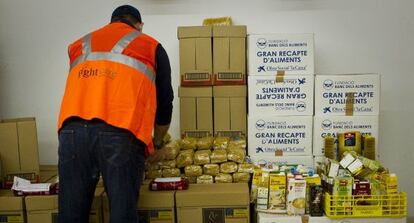Cáritas helping more people than ever
Catholic charity provided aid to 2.5 million in Spain in 2013, the most since start of crisis

Poverty is well entrenched in Spain. In 2013, Catholic charity Cáritas helped more people than ever since the start of the crisis: 2.5 million, a rise of 31 percent from 2012.
The charity says there are two types of particularly vulnerable aid recipients: large families and single mothers.
“The crisis is really hitting households with a lot of members or with dependents,” explained Sebastián Mora, secretary general for Cáritas, at the presentation of its 2013 annual report.
Griselys, a 28-year-old Dominican woman, is one of the single mothers mentioned in the report. Ever since her husband went to prison four months ago, she has been raising their three children – aged three, five and seven – by herself.
Now some families are asking for medication, and even vaccines
The other day Griselys received €70 from Cáritas to buy notebooks and pencils for her kids. “I also go there to get food, but you have to stand in line from 5am and some days there is not enough food for everybody,” she explains.
Gabriela Jorquera, the Madrid coordinator for the European Platform Against Poverty and Social Exclusion, says this increase is “very significant, since Cáritas is one of the largest organizations of its kind in Spain.”
Jorquera agrees that single-parent households always run a higher risk of poverty “because they live on just one salary, but in the case of women it is worse because they tend to earn less.”
Francisco Lorenzo, coordinator of the study group at Cáritas, says the profile of the average aid recipient has changed. “There are growing numbers of large families, and a rise in the number of Spaniards,” he says. While in 2007 the crisis was mostly felt by immigrants, in recent years the ratio has leveled out.
The aid organization has also noticed a change in the reasons why people come seeking assistance. While it used to be that they were struggling to pay the rent or buy food because they lost their job, now some families are asking for medication, and even vaccines, says Ana de la Calle, director of the social center at Villaverde (Madrid), in reference to the meningitis vaccine that is no longer administered for free at public health centers.
“We have noticed a great surge after the summer, especially in families with children, because you can eat whatever’s available, but when you don’t have enough to feed your children...” she says. The soup kitchen she runs has enough room for 200 people a day, but the waiting lists are as long as ever.
Luis González, head of the social action department of another charity, Acción Contra el Hambre, works with the long-term unemployed. “We have found that this group has become much more vulnerable,” he says, noting that many people have been forced to change their eating habits because of insufficient income.
Monday through Friday, Griselys and her three children eat at a soup kitchen in Villaverde and live in an apartment provided by Ivima, the Madrid housing authority, which she pays for with the €532 she gets every month from the regional government’s Renta Mínima de Inserción (RMI) welfare program, which ensures a minimum living income.
Yet Griselys always gets nervous as she counts the days to the end of each month. “Several days before September 30 I was already bugging my neighbor to give me a liter of milk or something for the children.”
Tu suscripción se está usando en otro dispositivo
¿Quieres añadir otro usuario a tu suscripción?
Si continúas leyendo en este dispositivo, no se podrá leer en el otro.
FlechaTu suscripción se está usando en otro dispositivo y solo puedes acceder a EL PAÍS desde un dispositivo a la vez.
Si quieres compartir tu cuenta, cambia tu suscripción a la modalidad Premium, así podrás añadir otro usuario. Cada uno accederá con su propia cuenta de email, lo que os permitirá personalizar vuestra experiencia en EL PAÍS.
¿Tienes una suscripción de empresa? Accede aquí para contratar más cuentas.
En el caso de no saber quién está usando tu cuenta, te recomendamos cambiar tu contraseña aquí.
Si decides continuar compartiendo tu cuenta, este mensaje se mostrará en tu dispositivo y en el de la otra persona que está usando tu cuenta de forma indefinida, afectando a tu experiencia de lectura. Puedes consultar aquí los términos y condiciones de la suscripción digital.








































